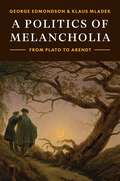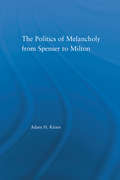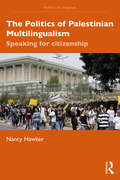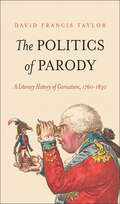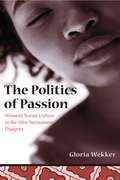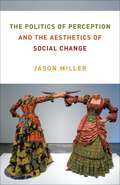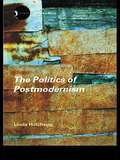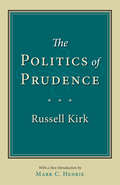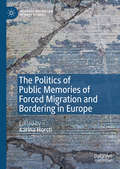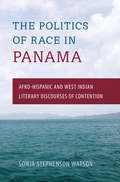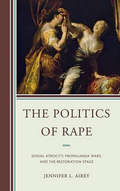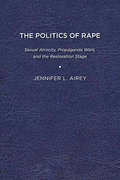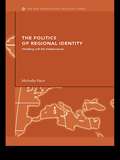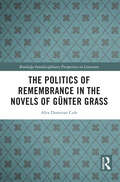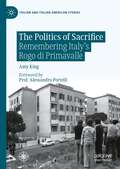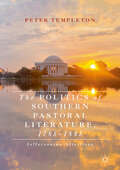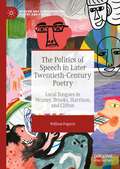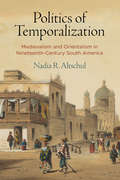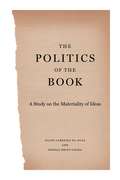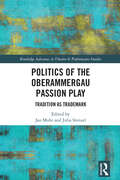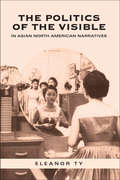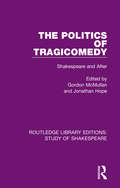- Table View
- List View
A Politics of Melancholia: From Plato to Arendt
by George Edmondson Klaus MladekWhy melancholia is a vital form of social critique and a catalyst for political renewalMelancholia is wrongly condemned as a condition of withdrawal and despair that alienates its sufferer from community. Countering that misconception, A Politics of Melancholia reclaims an understanding of melancholia not as an affliction in need of a remedy but as an affirmative stance toward decay and ruination in political life, and restores the melancholic figure—by turns inventive and destructive, outraged and inspired—to their rightful place as the poet of political thought.George Edmondson and Klaus Mladek identify pivotal moments of political melancholia in ancient and modern texts, offering new perspectives on the death of Socrates in Plato&’s dialogues, the fratricide in Hamlet, Woyzeck&’s killing of Marie in Georg Büchner&’s Woyzeck, the murder of Moses in Freud&’s thought, and the betrayal of the revolutionary idea that Hannah Arendt identifies in her critique of eighteenth-century revolutions. Melancholia emerges here as a disposition that is mournful but also jubilant, a mood of unbending disconsolation that remains faithful to a scene of downfall, to events that cannot be forgotten, and to things that cannot be governed.Recovering a tradition of thought that is both affirmative and hopeful, this eloquent book reveals how political melancholia embodies a shared condition of discontent that binds communities together and inspires change.
The Politics of Melancholy from Spenser to Milton (Literary Criticism and Cultural Theory)
by Adam KitzesDuring the so-called Age of Melancholy, many writers invoked both traditional and new conceptualizations of the disease in order to account for various types of social turbulence, ranging from discontent and factionalism to civil war. Writing about melancholy became a way to explore both the causes and preventions of political disorder, on both specific and abstract levels. Thus, at one and the same moment, a writer could write about melancholy to discuss specific and ongoing political crises and to explore more generally the principles which generate political conflicts in the first place. In the course of developing a traditional discourse of melancholy of its own, English writers appropriated representations of the disease - often ineffectively - in order to account for the political turbulence during the civil war and Interregnum periods
The Politics of Palestinian Multilingualism: Speaking for Citizenship (The Politics of Language)
by Nancy HawkerThe Politics of Palestinian Multilingualism: Speaking for Citizenship provides an essential contribution to understanding the politics of Israel/Palestine through the prism of sociolinguistics and discourse analysis. Arabic-speakers who also know Hebrew resort to a range of communicative strategies for their political ideas to be heard: they either accommodate or resist the Israeli institutional suppression of Arabic. They also codeswitch and borrow from Hebrew as well as from Arabic registers and styles in order to mobilise discursive authority. On political and cultural stages, multilingual Palestinian politicians and artists challenge the existing political structures. In the late capitalist market, language skills are re-packaged as commodified resources. With new evidence from recent and historical discourse, this book is about how speakers of a marginalised, contained language engage with the political system in the idioms at their disposal. The Politics of Palestinian Multilingualism: Speaking for Citizenship is key reading for advanced students and scholars of multilingualism, language contact, ideology, and policy, within sociolinguistics, anthropology, politics, and Middle Eastern studies.
The Politics of Parody: A Literary History of Caricature, 1760–1830 (The Lewis Walpole Series in Eighteenth-Century Culture and History)
by David Francis TaylorThis engaging study explores how the works of Shakespeare, Milton, Swift, and others were taken up by caricaturists as a means of helping the eighteenth-century British public make sense of political issues, outrages, and personalities. The first in-depth exploration of the relationship between literature and visual satire in this period, David Taylor&’s book explores how great texts, seen through the lens of visual parody, shape how we understand the political world. It offers a fascinating, novel approach to literary history.
The Politics of Passion: Women's Sexual Culture in the Afro-Surinamese Diaspora (Between Men-Between Women: Lesbian and Gay Studies)
by Gloria WekkerGloria Wekker analyzes the phenomenon of mati work, an old practice among Afro-Surinamese working-class women in which marriage is rejected in favor of male and female sexual partners. Wekker vividly describes the lives of these women, who prefer to create alternative families of kin, lovers, and children, and gives a fascinating account of women's sexuality that is not limited to either heterosexuality or same-sex sexuality. She offers new perspectives on the lives of Caribbean women, transnational gay and lesbian movements, and an Afro-Surinamese tradition that challenges conventional Western notions of marriage, gender, identity, and desire. Bringing these women's voices to the forefront, she offers an extensive and groundbreaking analysis of the unique historical, religious, psychological, economic, linguistic, cultural, and political forces that have shaped their lives.
The Politics of Perception and the Aesthetics of Social Change (Columbia Themes in Philosophy, Social Criticism, and the Arts)
by Jason MillerIn both politics and art in recent decades, there has been a dramatic shift in emphasis on representation of identity. Liberal ideals of universality and individuality have given way to a concern with the visibility and recognition of underrepresented groups. Modernist and postmodernist celebrations of disruption and subversion have been challenged by the view that representation is integral to social change. Despite this convergence, neither political nor aesthetic theory has given much attention to the increasingly central role of art in debates and struggles over cultural identity in the public sphere.Connecting Hegelian aesthetics with contemporary cultural politics, Jason Miller argues that both the aesthetic and political value of art are found in the reflexive self-awareness that artistic representation enables. The significance of art in modern life is that it shows us both the particular element in humanity as well as the human element in particularity. Just as Hegel asks us to acknowledge how different historical and cultural contexts produce radically different experiences of art, identity-based art calls on its audiences to situate themselves in relation to perspectives and experiences potentially quite remote—or even inaccessible—from their own. Miller offers a timely response to questions such as: How does contemporary art’s politics of perception contest liberal notions of deliberative politics? How does the cultural identity of the artist relate to the representations of cultural identity in their work? How do we understand and evaluate identity-based art aesthetically?Discussing a wide range of works of art and popular culture—from Antigone to Do the Right Thing and The Wire—this book develops a new conceptual framework for understanding the representation of cultural identity that affirms art’s capacity to effect social change.
The Politics of Postmodernism
by Linda HutcheonThis classic text remains one of the clearest and most incisive introductions to postmodernism. Perhaps more importantly, it is a compelling discussion of why postmodernism matters. Working through the issue of representation in art forms from fiction to photography, Linda Hutcheon sets out postmodernism's highly political challenge to the dominant ideologies of the western world. A new epilogue traces the fate of the postmodern over the last ten years and into the future, responding to claims that it has, once and for all, 'failed'.Together with the new epilogue, this edition contains revised notes on further reading and a fully updated bibliography. This revised edition of The Politics of Postmodernism continues its position as essential reading.
The Politics of Prudence
by Russell KirkIn this classic title, Kirk outlines ten principles of conservative thought, summarizes ten vital conservative books, and offers brief accounts of ten eminent, internationally important conservatives. This book, written by the founder of modern conservatism in America, reflects several decades of learning, travel, and practical politics.
The Politics of Public Memories of Forced Migration and Bordering in Europe (Palgrave Macmillan Memory Studies)
by Karina HorstiIncreasingly, the European Union and its member states have exhibited a lack of commitment to protecting the human rights of non-citizens. Thinking beyond the oppressive bordering taking place in Europe requires new forms of scholarship. This book provides such examples, offering the analytical lenses of memory and temporality. It also identifies ways of collaborating with people who experience the violence of borders. Established scholars in fields such as history, anthropology, literary studies, media studies, migration and border studies, arts, and cultural studies offer important contributions to the so-called “European refugee crisis”.
The Politics of Race in Panama: Afro-Hispanic and West Indian Literary Discourses of Contention
by Sonja S. Watson"Delves into the historical convergence of peoples and cultural traditions that both enrich and problematize notions of national belonging, identity, culture, and citizenship."--Antonio D. Tillis, editor of Critical Perspectives on Afro-Latin American Literature "With rich detail and theoretical complexity, Watson reinterprets Panamanian literature, dismantling longstanding nationalist interpretations and linking the country to the Black Atlantic and beyond. An engaging and important contribution to our understanding of Afro-Latin America."--Peter Szok, author of Wolf Tracks: Popular Art and Re-Africanization in Twentieth-Century Panama "Illuminates the deeper discourse of African-descendant identities that runs through Panama and other Central American countries."--Dawn Duke, author of Literary Passion, Ideological Commitment: Toward a Legacy of Afro-Cuban and Afro-Brazilian Women Writers This volume tells the story of two cultural groups: Afro-Hispanics, whose ancestors came to Panama as African slaves, and West Indians from the English-speaking countries of Jamaica and Barbados who arrived during the mid-nineteenth and early-twentieth centuries to build the railroad and the Panama Canal. While Afro-Hispanics assimilated after centuries of mestizaje (race mixing) and now identify with their Spanish heritage, West Indians hold to their British Caribbean roots and identify more closely with Africa and the Caribbean. By examining the writing of black Panamanian authors, Sonja Watson highlights how race is defined, contested, and inscribed in Panama. She discusses the cultural, racial, and national tensions that prevent these two groups from forging a shared Afro-Panamanian identity, ultimately revealing why ethnically diverse Afro-descendant populations continue to struggle to create racial unity in nations across Latin America and the Caribbean. Sonja Stephenson Watson is director of the Women’s and Gender Studies Program and associate professor of Spanish at the University of Texas at Arlington. A volume in the series Latin American and Caribbean Arts and Culture, funded by the Andrew W. Mellon Foundation.
The Politics of Rape: Sexual Atrocity, Propaganda Wars, and the Restoration Stage
by Jennifer L. AireyThe Politics of Rape: Sexual Atrocity, Propaganda Wars, and the Restoration Stage is the first full-length study to examine representations of sexual violence on the Restoration stage. By reading theatrical depictions of sexual violence alongside political tracts, propaganda pamphlets, and circulating broadsides, this study argues that authors used dramatic representations of rape to respond to and engage with late-century upheavals in British political culture. Beginning with an examination of rape scenes in English Civil War propaganda, The Politics of Rape argues that Roundhead authors described acts of rape and atrocity to demonize their enemies, the Irish, the Catholics, and the Cavaliers. After the Restoration, propagandists and playwrights on each side of every political conflict would follow suit, altering the rhetoric of sexual violence in response to each new moment of political upheaval: The Restoration of Charles II, the Second and Third Anglo-Dutch Wars, the Popish Plot, the Exclusion Crisis, the Glorious Revolution, and the accession of William and Mary. The study offers an intensive look at British propaganda culture, gathering together a wealth of understudied pamphlet texts, and identifying a series of stock figures that recur throughout the century: The demonic Irishman, sexually violent villain of the 1641 Irish Rebellion tracts; the debauched Cavalier, the secretly Catholic royalist rapist; the poisonous Catholic bride, the malignant consort who encourages the rapes of Protestant women; the cannibal father, the evil patriarch who rapes his daughters-in-laws before ingesting his own sons as a symbol of monarchical overreach; and the ravished monarch, the male rape victim whose sexual violation protests his political disenfranchisement. The study also traces the appearance of these figures on the British stage, examining well-known works by Dryden, Rochester, Behn, Lee, and Shadwell, alongside lesser-known plays by Orrery, Howard, Settle, Crowne, Ravenscroft, Pix, Cibber, and Brady. The Politics of Rape thus offers a new method for understanding of the geo-political implications of theatrical sexual violence. Published by University of Delaware Press. Distributed worldwide by Rutgers University Press.
The Politics of Rape: Sexual Atrocity, Propaganda Wars, and the Restoration Stage
by Jennifer L. AireyThe Politics of Rape: Sexual Atrocity, Propaganda Wars, and the Restoration Stage is the first full-length study to examine representations of sexual violence on the Restoration stage. By reading theatrical depictions of sexual violence alongside political tracts, propaganda pamphlets, and circulating broadsides, this study argues that authors used dramatic representations of rape to respond to and engage with late-century upheavals in British political culture. Beginning with an examination of rape scenes in English Civil War propaganda, The Politics of Rape argues that Roundhead authors described acts of rape and atrocity to demonize their enemies, the Irish, the Catholics, and the Cavaliers. After the Restoration, propagandists and playwrights on each side of every political conflict would follow suit, altering the rhetoric of sexual violence in response to each new moment of political upheaval: The Restoration of Charles II, the Second and Third Anglo-Dutch Wars, the Popish Plot, the Exclusion Crisis, the Glorious Revolution, and the accession of William and Mary. The study offers an intensive look at British propaganda culture, gathering together a wealth of understudied pamphlet texts, and identifying a series of stock figures that recur throughout the century: The demonic Irishman, sexually violent villain of the 1641 Irish Rebellion tracts; the debauched Cavalier, the secretly Catholic royalist rapist; the poisonous Catholic bride, the malignant consort who encourages the rapes of Protestant women; the cannibal father, the evil patriarch who rapes his daughters-in-laws before ingesting his own sons as a symbol of monarchical overreach; and the ravished monarch, the male rape victim whose sexual violation protests his political disenfranchisement. The study also traces the appearance of these figures on the British stage, examining well-known works by Dryden, Rochester, Behn, Lee, and Shadwell, alongside lesser-known plays by Orrery, Howard, Settle, Crowne, Ravenscroft, Pix, Cibber, and Brady. The Politics of Rape thus offers a new method for understanding of the geo-political implications of theatrical sexual violence. Published by University of Delaware Press. Distributed worldwide by Rutgers University Press.
The Politics of Regional Identity: Meddling with the Mediterranean (New International Relations)
by Michelle PaceA keen analysis of the impact of European regionalism in the Mediterranean, focusing on the politics of representation and constructions of identity.The Mediterranean - as a region, as an area of EU policy and as a place on the fringe of a rapidly integrating Europe - has been a theoretically under-researched area. Containing empirical research on Greece, Malta and Morocco, this theory-led investigation into the political effects of the Mediterranean's symbolic geography, complements work done on the constitution of entities such as nations, Europe and the West. The Politics of Regional Identity draws on the field of critical IR and critical geopolitics to examine both the theoretical and empirical manifestations of these changing geopolitical images and discourses. This book will be of great interest to all students and scholars of politics, international relations and the European Union.
The Politics of Remembrance in the Novels of Günter Grass (Routledge Interdisciplinary Perspectives on Literature)
by Alex Donovan ColeThis manuscript argues for the importance of Günter Grass as a political thinker in addition to his status as a novelist and public intellectual, capable of forming ethical responses to contemporary issues like neoliberalism and place of the petit bourgeoisie in social life. I define Grass’s trajectory as a thinker through his novels and speeches. Primarily, I draw attention to the role memory plays in Grass’s thought: that his work represented an intellectual and aesthetic response to the role Nazism continued to play in West German politics in the post war era. To Grass, Nazism represented a resurgent threat unaddressed following the end of World War II. Later, Grass amended his concept of memory politics to address neoliberal capitalism, reiterating his radicalism and affirming the need for German society to resist the rise of extreme ideologies.
The Politics of Resentment: A Genealogy
by Jeremy EngelsIn the days and weeks following the tragic 2011 shooting of nineteen Arizonans, including congresswoman Gabrielle Giffords, there were a number of public discussions about the role that rhetoric might have played in this horrific event. In question was the use of violent and hateful rhetoric that has come to dominate American political discourse on television, on the radio, and at the podium. A number of more recent school shootings have given this debate a renewed sense of urgency, as have the continued use of violent metaphors in public address and the dishonorable state of America’s partisan gridlock. This conversation, unfortunately, has been complicated by a collective cultural numbness to violence. But that does not mean that fruitful conversations should not continue. In The Politics of Resentment, Jeremy Engels picks up this thread, examining the costs of violent political rhetoric for our society and the future of democracy.The Politics of Resentment traces the rise of especially violent rhetoric in American public discourse by investigating key events in American history. Engels analyzes how resentful rhetoric has long been used by public figures in order to achieve political ends. He goes on to show how a more devastating form of resentment started in the 1960s, dividing Americans on issues of structural inequalities and foreign policy. He discusses, for example, the rhetorical and political contexts that have made the mobilization of groups such as Nixon’s “silent majority” and the present Tea Party possible. Now, in an age of recession and sequestration, many Americans believe that they have been given a raw deal and experience feelings of injustice in reaction to events beyond individual control. With The Politics of Resentment, Engels wants to make these feelings of victimhood politically productive by challenging the toxic rhetoric that takes us there, by defusing it, and by enabling citizens to have the kinds of conversations we need to have in order to fight for life, liberty, and equality.
The Politics of Resentment: A Genealogy
by Jeremy EngelsIn the days and weeks following the tragic 2011 shooting of nineteen Arizonans, including congresswoman Gabrielle Giffords, there were a number of public discussions about the role that rhetoric might have played in this horrific event. In question was the use of violent and hateful rhetoric that has come to dominate American political discourse on television, on the radio, and at the podium. A number of more recent school shootings have given this debate a renewed sense of urgency, as have the continued use of violent metaphors in public address and the dishonorable state of America’s partisan gridlock. This conversation, unfortunately, has been complicated by a collective cultural numbness to violence. But that does not mean that fruitful conversations should not continue. In The Politics of Resentment, Jeremy Engels picks up this thread, examining the costs of violent political rhetoric for our society and the future of democracy.The Politics of Resentment traces the rise of especially violent rhetoric in American public discourse by investigating key events in American history. Engels analyzes how resentful rhetoric has long been used by public figures in order to achieve political ends. He goes on to show how a more devastating form of resentment started in the 1960s, dividing Americans on issues of structural inequalities and foreign policy. He discusses, for example, the rhetorical and political contexts that have made the mobilization of groups such as Nixon’s “silent majority” and the present Tea Party possible. Now, in an age of recession and sequestration, many Americans believe that they have been given a raw deal and experience feelings of injustice in reaction to events beyond individual control. With The Politics of Resentment, Engels wants to make these feelings of victimhood politically productive by challenging the toxic rhetoric that takes us there, by defusing it, and by enabling citizens to have the kinds of conversations we need to have in order to fight for life, liberty, and equality.
The Politics of Sacrifice: Remembering Italy's Rogo di Primavalle (Italian and Italian American Studies)
by Amy KingThis book offers an original and comprehensive study of the memory of the Rogo di Primavalle, a fatal arson attack on the home of a far-right family on 16 April 1973. Perpetrated by members of the militant left group Potere Operaio, this was the first attack on a domestic space during Italy’s Years of Lead. Through analysis of media coverage, books, and social media; observation of commemoration ceremonies; visits to sites of memory; and oral history interviews conducted by the author, The Politics of Sacrifice argues that memory of the Rogo di Primavalle has been instrumentalised by neo-fascist groups over the past 50 years. Drawing on contemporary theoretical debates relating to public and private memories, King connects the construction of a narrative of sacrifice to challenges faced by the institutional far right from the time of the Movimento Sociale Italiano in the 1970s, Alleanza Nazionale in the mid-1990s, and Fratelli d’Italia today. With the far right on the rise in Italy and abroad, the book identifies the characteristics of remembering that define far-right memory culture and investigates the role of memory in building support for the far right over time.
The Politics of Southern Pastoral Literature, 1785–1885: Jeffersonian Afterlives
by Peter TempletonIn The Politics of Southern Pastoral Literature, 1785–1885: Jeffersonian Afterlives, Peter Templeton presents a wide-ranging and systematic evaluation of pastoral in the nineteenth-century Southern novel, offering an explicit appraisal of the philosophical and political rationale of pastoral literature alongside the existing body of research into the image of Jefferson following his death. Rather than assuming a homogeneous South, Templeton locates Southern pastoral in its specific political context, offering readings of significant factors such as the literary representation of landscape, of class and the yeoman ideal, and the institution of slavery and its intellectual underpinnings. Focusing on a six key Southern authors, both canonical and relatively understudied, the book charts key transformations in the politics of pastoral literature in the period, and noteworthy reconfigurations in the representation of Jefferson and his philosophies, in order to analyze what these signified to nineteenth-century Americans. In doing so, the text also demonstrates how ideologies react to the stresses imposed on them by political realities.
The Politics of Speech in Later Twentieth-Century Poetry: Local Tongues in Heaney, Brooks, Harrison, and Clifton (Modern and Contemporary Poetry and Poetics)
by William FogartyThe Politics of Speech in Later Twentieth-Century Poetry: Local Tongues in Heaney, Brooks, Harrison, and Clifton argues that local speech became a central facet of English-language poetry in the second half of the twentieth century. It is based on a key observation about four major poets from both sides of the Atlantic: Seamus Heaney, Gwendolyn Brooks, Tony Harrison, and Lucille Clifton all respond to societal crises by arranging, reproducing, and reconceiving their particular versions of local speech in poetic form. The book’s overarching claim is that “local tongues” in poetry have the capacity to bridge aesthetic and sociopolitical realms because nonstandard local speech declares its distinction from the status quo and binds people who have been subordinated by hierarchical social conditions, while harnessing those versions of speech into poetic structures can actively counter the very hierarchies that would degrade those languages. The diverse local tongues of these four poets marshaled into the forms of poetry situate them at once in literary tradition, in local contexts, and in prevailing social constructs.
Politics of Temporalization: Medievalism and Orientalism in Nineteenth-Century South America
by Nadia R. AltschulA postcolonial study of the conceptualization of nineteenth- and twentieth-century Latin America as medieval and orientalIf Spain and Portugal were perceived as backward in the nineteenth century—still tainted, in the minds of European writers and thinkers, by more than a whiff of the medieval and Moorish—Ibero-America lagged even further behind. Originally colonized in the late fifteenth century, Chile, Argentina, and Brazil were characterized by European travelers and South American elites alike as both feudal and oriental, as if they retained an oriental-Moorish character due to the centuries-long presence of Islam in the Iberian Peninsula. So, Nadia R. Altschul observes, the Scottish metropolitan writer Maria Graham (1785-1842) depicted the Chile in which she found herself stranded after the death of her sea captain husband as a premodern, precapitalist, and orientalized place that could only benefit from the free trade imperialism of the British. Domingo F. Sarmiento (1811-1888), the most influential Latin American writer and statesman of his day, conceived of his own Euro-American creole class as medieval in such works as Civilization and Barbarism: The Life of Juan Facundo Quiroga (1845) and Recollections of a Provincial Past (1850), and wrote of the inherited Moorish character of Spanish America in his 1883 Conflict and Harmony of the Races in America. Moving forward into the first half of the twentieth century, Altschul explores the oriental character that Gilberto Freyre assigned to Portuguese colonization in his The Masters and the Slaves (1933), in which he postulated the "Mozarabic" essence of Brazil.In Politics of Temporalization, Altschul examines the case of South America to ask more broadly what is at stake—what is harmed, what is excused—when the present is temporalized, when elements of "the now" are characterized as belonging to, and consequently imposed upon, a constructed and othered "past."
The Politics of the Book: A Study on the Materiality of Ideas (Penn State Series in the History of the Book #30)
by Filipe Carreira da Silva Monica Brito VieiraIt is impossible to separate the content of a book from its form. In this study, Filipe Carreira da Silva and Mónica Brito Vieira expand our understanding of the history of social and political scholarship by examining how the entirety of a book mediates and constitutes meaning in ways that affect its substance, appropriation, and reception over time.Examining the evolving form of classic works of social and political thought, including W. E. B. Du Bois’s The Souls of Black Folk, G. H. Mead’s Mind, Self, and Society, and Karl Marx’s 1844 Economic and Philosophic Manuscripts, Carreira da Silva and Brito Vieira show that making these books involved many hands. They explore what publishers, editors, translators, and commentators accomplish by offering the reading public new versions of the works under consideration, examine debates about the intended meaning of the works and discussions over their present relevance, and elucidate the various ways in which content and material form are interwoven. In doing so, Carreira da Silva and Brito Vieira characterize the editorial process as a meaning-producing action involving both collaboration and an ongoing battle for the importance of the book form to a work’s disciplinary belonging, ideological positioning, and political significanceTheoretically sophisticated and thoroughly researched, The Politics of the Book radically changes our understanding of what doing social and political theory—and its history—implies. It will be welcomed by scholars of book history, the history of social and political thought, and social and political theory.
The Politics of the Book: A Study on the Materiality of Ideas (Penn State Series in the History of the Book)
by Filipe Carreira da Silva Monica Brito VieiraIt is impossible to separate the content of a book from its form. In this study, Filipe Carreira da Silva and Mónica Brito Vieira expand our understanding of the history of social and political scholarship by examining how the entirety of a book mediates and constitutes meaning in ways that affect its substance, appropriation, and reception over time.Examining the evolving form of classic works of social and political thought, including W. E. B. Du Bois’s The Souls of Black Folk, G. H. Mead’s Mind, Self, and Society, and Karl Marx’s 1844 Economic and Philosophic Manuscripts, Carreira da Silva and Brito Vieira show that making these books involved many hands. They explore what publishers, editors, translators, and commentators accomplish by offering the reading public new versions of the works under consideration, examine debates about the intended meaning of the works and discussions over their present relevance, and elucidate the various ways in which content and material form are interwoven. In doing so, Carreira da Silva and Brito Vieira characterize the editorial process as a meaning-producing action involving both collaboration and an ongoing battle for the importance of the book form to a work’s disciplinary belonging, ideological positioning, and political significance.Theoretically sophisticated and thoroughly researched, The Politics of the Book radically changes our understanding of what doing social and political theory—and its history—implies. It will be welcomed by scholars of book history, the history of social and political thought, and social and political theory.
Politics of the Oberammergau Passion Play: Tradition as Trademark (Routledge Advances in Theatre & Performance Studies)
by Jan Mohr Julia StenzelThis collection provides a comprehensive overview of the Oberammergau Passion play and its history from the 19th century onwards. Specialists in theatre and performance studies, comparative literature, theology, political studies, history, and ethnology initiate an interdisciplinary discussion of how Oberammergau has built a trademark from tradition. A typological and historical outline of this development is followed by detailed analyses of the blending of spaces, temporalities, and cultures, through which Oberammergau as an institution is stabilized while at the same time remaining open to the dynamics of historical change. The authors comprise the formation of a theatrical public sphere, literary imaginations, and layers of authenticity in modern practices of distributed communication that culminate in the notion of tradition as trademark. This collection is analysed from a wide spectrum of cultural historical perspectives, ranging from literary studies, theatre and performance studies to theology, political studies, and ethnology.
The Politics of the Visible in Asian North American Narratives
by Eleanor TyExamining nine Asian Canadian and Asian American narratives, Eleanor Ty explores how authors empower themselves, represent differences, and re-script their identities as 'visible minorities' within the ideological, imaginative, and discursive space given to them by dominant culture. In various ways, Asian North Americans negotiate daily with 'birthmarks,' their shared physical features marking them legally, socially, and culturally as visible outsiders, and paradoxically, as invisible to mainstream history and culture.Ty argues that writers such as Denise Chong, Shirley Geok-lin Lim, and Wayson Choy recast the marks of their bodies and challenge common perceptions of difference based on the sights, smells, dress, and other characteristics of their hyphenated lives. Others, like filmmaker Mina Shum and writers Bienvenido Santos and Hiromi Goto, challenge the means by which Asian North American subjects are represented and constructed in the media and in everyday language. Through close readings grounded in the socio-historical context of each work, Ty studies the techniques of various authors and filmmakers in their meeting of the gaze of dominant culture and their response to the assumptions and meanings commonly associated with Orientalized, visible bodies.
The Politics of Tragicomedy: Shakespeare and After (Routledge Library Editions: Study of Shakespeare)
by Gordon McMullan Jonathan HopeThe Politics of Tragicomedy: Shakespeare and After offers a series of sophisticated and powerful readings of tragicomedy from Shakespeare’s late plays to the drama of the Interregnum. Rejecting both the customary chronological span bounded by the years 1603-42 (which presumes dramatic activity stopped with the closing of the theatres) and the negative critical attitudes that have dogged the study of tragicomedy, the essays in this collection examine a series of issues central to the possibility of a politics for the genre. Individual essays offer important contributions to continuing debates over the role of the drama in the years preceding the Civil War, the colonial contexts of The Tempest, the political character of Jonson’s late plays, and the agency of women as public and theatre actors. The introduction presents a strong challenge to previous definitions of tragicomedy in the English context, and the collection as a whole is characterized by its rejection of absolutist strategies for reading tragicomedy. This collection will prove essential reading for all with an interest in the politics of Renaissance drama; for specialists in the work of Shakespeare, Fletcher, and Jonson; for those interested in genre and dramatic forms; and for historians of early Stuart England.
